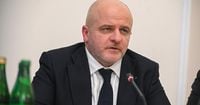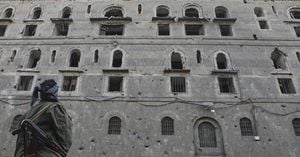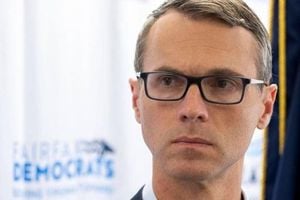Poland is positioning itself as a central hub for the reconstruction of Ukraine, according to Paweł Kowal, the Polish government’s representative for Ukrainian reconstruction. In a recent interview with the Polish Press Agency (PAP), Kowal emphasized that Poland is ready to play a significant role in this process, which he outlined as having three main pillars: export, logistics, and support for Polish firms.
The export pillar is valued at approximately 13 billion euros, with Kowal noting, "Export always precedes investments, creates jobs in Poland, and involves many people – so we support it with appropriate export instruments." This focus on export is crucial as it lays the groundwork for further investments in Ukraine.
Logistics is the second pillar, where Poland aims to serve as a major logistical hub for the reconstruction efforts, similar to its role during military operations. "Poland will be a major hub for reconstruction, just as it was a military hub," Kowal stated, highlighting the importance of enhancing connectivity and transit capabilities.
The final pillar involves facilitating Polish companies that wish to invest in Ukraine. The European Commission's Ukraine Facility has allocated several hundred million euros in guarantees and 56 million euros in grants to prepare Polish firms for the Ukrainian market. Additionally, 250 million złotys have been earmarked for Polish companies participating in the reconstruction from Poland.
Kowal reassured that Poland is well-prepared for its role in Ukraine's rebuilding, stating, "Today, we look at this problem through the lens of sectors and the capabilities of individual countries. Some countries are still cautious about engaging in specific regions, but we have been more involved, for example, in Kharkiv. However, the approach to reconstruction is changing, and funding from the EU is key in addressing the current needs of Ukraine."
Key sectors for Polish involvement include aviation, construction, renewable energy, and transport. Kowal mentioned that several events focusing on Ukraine's reconstruction are planned in Poland, including congresses and conferences in Poznań, Warsaw, and Rzeszów throughout 2025.
However, despite these ambitious plans, there are concerns among Polish entrepreneurs regarding the execution and financial mechanisms in place. Following discussions with Kowal and business representatives, it has become evident that there is a disconnect between the government’s plans and the needs of the business community. Many entrepreneurs expressed frustration over the lack of concrete financial mechanisms to support their entry into the Ukrainian market.
Rafał Tomala, president of the Foundation for Regional Development, pointed out that there are currently no instruments to support Polish investments, stating, "You can only obtain credit if you have an order from the Ukrainian side, which lacks financing." This has led to skepticism about the feasibility of the proposed reconstruction efforts.
Karol Kubica, director of the Foreign Trade Office in Kyiv, mentioned that the Ministry of Funds and Regional Policy is developing a fund of 250 million złotys, which will offer loans of up to 10 million złotys with interest rates ranging from 1% to 2%, repayable over 10 to 12 years. This fund is expected to launch in May 2025, which could provide some relief to Polish businesses.
Despite the challenges, Kowal remains optimistic, stating that there is interest from Polish firms, but he acknowledges that the necessary financial mechanisms have yet to be fully established. He noted that the response to the BGK instrument within the Ukraine Facility has resulted in several hundred project proposals, indicating a willingness among businesses to engage.
However, the absence of Kowal at a recent event in Lviv, intended for Polish business leaders interested in investing in Ukraine, raised eyebrows. His failure to attend in person and the subsequent online greeting led to criticism from attendees, who felt it reflected poorly on the government's commitment to facilitating business engagement. "We know everything about the reconstruction of Ukraine already," one organizer quipped, highlighting the frustration felt by many.
Furthermore, there are concerns about the overall vision and strategic planning for Poland's role in Ukraine's reconstruction. Ewa Zakowicz, president of a large financial firm operating in Ukraine, emphasized the need for a comprehensive understanding of the Ukrainian market, stating, "You cannot understand the specifics of the Ukrainian market by visiting occasionally for a few days. You need to engage with those who have been here for years or create a team that handles these matters daily."
Poland has historically invested in Ukraine, with investments totaling 779.9 million dollars since 2009, ranking eighth among countries investing in Ukraine in 2023. However, as other countries ramp up their efforts, including France, which has allocated 10 billion hryvnias (approximately 250 million dollars) for its businesses, there is a growing concern that Poland may fall behind.
Wasyl Bodnar, the Ukrainian ambassador to Poland, noted that many European countries are already establishing themselves in areas of Ukraine’s reconstruction. He urged greater government involvement in facilitating business missions and opportunities for Polish entrepreneurs.
In conclusion, while Poland has laid out an ambitious framework for its involvement in the reconstruction of Ukraine, significant challenges remain. The lack of effective financial mechanisms, the need for a clearer strategic vision, and the importance of fostering better communication between the government and the business community are critical for Poland to realize its potential as a key player in Ukraine's recovery. As the reconstruction efforts continue, the urgency for Poland to solidify its role and capitalize on its geographical and economic advantages cannot be overstated.





